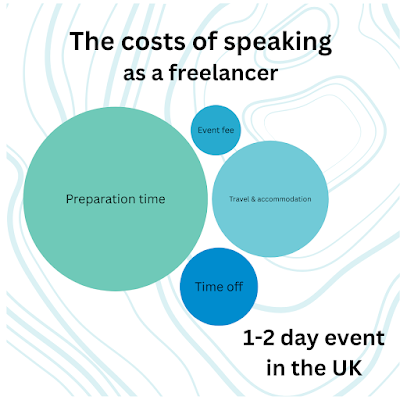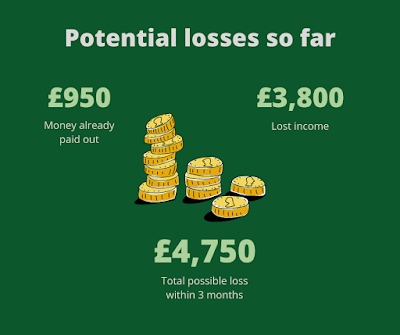The cost of speaking: ELT conferences as a freelancer
Recently, I’ve seen a number of posts and calls for papers for upcoming ELT conferences and had a few online exchanges with colleagues trying to encourage me to sign up for events coming up in 2024.
I love going to ELT conferences. As a freelancer who spends most of the year working alone at home, it’s a really good opportunity to catch up with ELT colleagues on both a social and professional level. It’s a good way to get a feel for what’s going on in the industry – sometimes just confirming what I’ve been seeing on social media, but occasionally throwing up new perspectives and information as well. And it’s a really important networking opportunity – maintaining contacts, making new ones, finding out who’s moved where in the ELT publishing merry-go-round, and talking to the right people about potential new projects.
Speaking at an event boosts all of those things. If your name’s in the programme, it flags to people you’re there and they’re more likely to seek you out, whether or not they come along to your session. It raises your profile and reminds people of your area of expertise. It also gives you a focus for the event.
However … attending and speaking at a conference is really expensive, not just in terms of the obvious costs of registration and travel, but the indirect costs too which are often far more significant.
The surfaces costs: The costs of registration can range enormously depending on the event. Sometimes speakers get free registration, but often they don’t. There’s travel and accommodation. Then you can add on all the miscellaneous costs of things like food and endless cups of coffee!
The prep: For me, this is the biggest ‘cost’ of speaking at an event. To prepare a new talk from scratch takes a lot of time:
· initial time to come up with an idea and sketch out notes
· putting together a proposal. Proposal forms vary – some are quite simple and just require a title and summary, others are more long-winded with abstracts and summaries and various other questions to be answered, all within strict word limits.
· putting together your actual session, deciding on a structure, doing your research, designing your slides and deciding what you’ll say to go with each one.
· rehearsing and working out your timings, then rehearsing again until you’re confident in what you’re going to say.
Nowadays, there’s often a requirement to do some form of promotion for your session. Increasingly, that’s a video which you’re told “won’t take long”, but in my experience, usually swallows up at least a whole morning – deciding what to say, getting set up, doing a few takes, uploading and doing a bit of editing, then posting or sending on the final video.
How long all this takes depends, in part, on whether it’s a completely new talk or a new version of a talk you’ve given before. Occasionally, I’ve been able to reuse talks several times, but that’s dependant on whether the session fits in with the theme of an event, whether it’s still up-to-date and relevant, and whether a sponsor is happy for you to repeat it. (I’ll come onto the issue of sponsors in a bit.) But I’d say anywhere between 15 and 25 hours’ prep is what I’d expect.
As someone managing a chronic health condition, I have to strictly limit the hours I spend at my desk each week, so prep for a conference can’t just be added on top of my regular working hours. Of course, that time should count as ‘proper work’ whatever your circumstances, but in my case, it literally replaces paid hours on other jobs. So, if it takes me a week or more likely, a week-and-a-half’s worth of hours, I lose that much paid income.
The time out: As a freelancer, I don’t get paid for the days I’m actually at the event, both the days there and the travel days. So that’s more lost income to factor into the cost.
Adding all of that together, counting the prep hours and the days out at my usual hourly rate, can easily come to the equivalent of a whole month’s income for a long event life IATEFL. Similarly, for a foreign trip with the extra travel and accommodation costs. And that’s not some theoretical calculation, it’s real lost income. If I give an unsponsored talk at IATEFL, that effectively means no income for April that year. And yes, I know it’s an investment in my business, but that’s a big hit when you’re already trying to support yourself on a part-time income.
Sponsors: All of which is why, where possible I try to speak on behalf of publishers. That doesn’t necessarily cover all the costs – amounts offered for prep rarely cover all the time and they usually only cover one night’s accommodation and one day’s ‘income’ – but it makes it more manageable. Speaking on behalf of a publisher though is contingent on you having recently worked on a project that they want to promote and on the talk fitting in with their marketing plans. Flagship new coursebook series are always going to attract more marketing budget than the kind of smaller, niche vocab materials I tend to work on!
Speaking for a sponsor also relies on the event accepting proposals for ‘promotional’ talks. I was looking at one event this week which specifically rules them out – which I understand, but also rules me out as a speaker.
So, yes, I’d love to come along to all those great events out there, but budgets for 2024 will likely mean just IATEFL and maybe one more.
Labels: conferences, costs, freelancing, IATEFL









